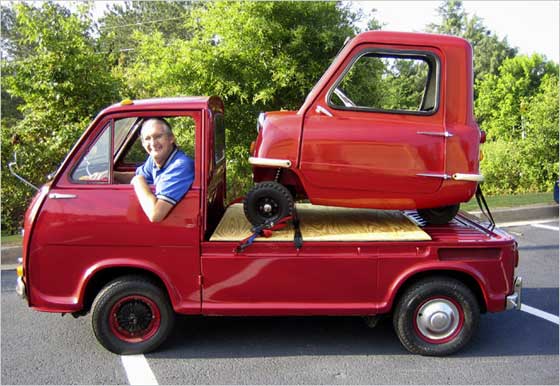Compostable Coffee Cups from Repurpose
January 22nd, 2012 Posted in food, inventions, paper | 1 Comment » Make sure you like EcoJoes on Facebook to stay updated on green ways to save money and help the environment. Just click the "like" button below. Muchas gracias!Here at EcoJoes, we’ve looked at styrofoam and paper disposable cups, and came to the not-so-stunning conclusion that it’s best to use reusable cups. Not only are reusable cups good for the environment, they can save you money at coffee shops! Hot diggity.
But for most people, every once in a while they forget their reusable mug, so they buy coffee in a disposable cup. Hopefully, it’s a compostable, paper, insulated cup from Repurpose.
I got to test out one of these bad boys today, and it worked great. The paper wall is sort of puffy, so it stays insulated without needing extra layers of paper or a paper sleeve, meaning it uses less paper than most other disposable cups. How about that.
I’ve had about 3 cups o’ coffee today in my cup, and it did great keeping the coffee warm (at least 15 minutes staying the perfect temperature). The cup’s still holding together fine, too. Your hands won’t get burnt either, even if the drink is piping hot.
The neatest part to me is that Repurpose claims these cups (and the lids) are compostable within 90 days. That doesn’t mean I can watch it compost in my home composter, though.
As the Repurpose Compostables C.M.O. points out,
Our cups compost in an industrial composter, not your home composter. So you won’t be able to watch them compost at home. The product needs the heat and humidity that only an industrial composter provides and then it turns on the break down like switch and it takes 45-90 days to finally compost. They are ASTM 6400 and BPI certified to do so.
Researchers are still working on viable home composting possibilities for single use products. The problem is that in order to withstand the heat and moisture of your cup of coffee, the cup has to have an integrity that makes the home composter not an option if that makes sense. If it composted at home in any conditions it wouldn’t be a very sturdy product.



 Dang!! Back in college, me and some of my friends talked a lot about creating perpetual motion machines, and came up with all kinds of different designs. Eventually we decided it was impossible, and abandoned the idea.
Dang!! Back in college, me and some of my friends talked a lot about creating perpetual motion machines, and came up with all kinds of different designs. Eventually we decided it was impossible, and abandoned the idea.